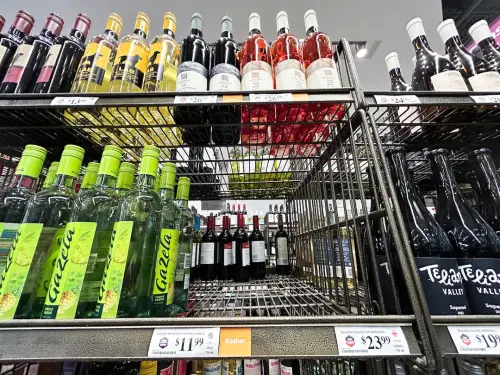Introduction
Many Canadian Jews are struggling to find Manischewitz kosher wine, a staple for Passover, due to the Canadian government's ban on U.S. imports in response to President Trump's policies. This situation highlights the impact of the trade war on consumers and companies alike.
Context
For Jews in Canada, as in the U.S., Manischewitz kosher wine is essential for Passover and other religious celebrations. However, with Canadian government retailers and wholesale monopolies removing American-made products from their shelves, it has become difficult to find this wine ahead of the wine-heavy spring holiday.
Developments
The shortage of Manischewitz illustrates how Trump's instigation of a trade war with Canada and provocative rhetoric is affecting Canadian consumers and U.S. beverage companies, like E & J Gallo Winery, while possibly benefiting Canadian competitors. Many Canadian shoppers are now embracing a "Buy Canadian" movement and are avoiding U.S.-made goods. However, for specialized products like the sweet and fruity Manischewitz kosher wine, there are few alternatives, according to retailers and consumers.
- Canada's provincial governments, which control liquor sales and wholesaling, have banned U.S. alcohol imports and most distribution and sales since early March, impacting popular brands like Manischewitz wine and Jack Daniels bourbon whiskey.
- Stocks of these products have been withdrawn from shelves across Canada, and private stores, which can sell existing supplies, report that customers rapidly purchased whatever Manischewitz bottles they had after the bans were announced.
"People are freaking out," said Louise Waldman, a Jew from Winnipeg who has fond memories of Manischewitz wine from past Passover meals.
Manischewitz and Gallo did not respond to requests for comment.
With Passover starting on April 12, Jewish families will gather for traditional seders, during which they eat specific foods and drink four glasses of wine. Aaron Bernstein, of Bernstein's Delicatessen, a Jewish food store in Winnipeg, shared that he has had to inform customers that there are no domestic alternatives to some kosher products. "There's no other product like Manischewitz wine," he said.
Although Canadian Jews may find some Israeli wines in government-operated liquor stores, including offerings from the Galil Mountain Winery, the search for kosher products continues. Meanwhile, some Canadian kosher food producers see the patriotic sentiment as an opportunity to expand their businesses. Ritesh Patel, director of operations for Elman's Food Products, hopes to tap into the domestic kosher market in light of the situation.
To compensate for missing American products, Bernstein's deli is ordering more from Israel, although shipping times can be longer due to supply chain delays. For some Canadian Jews who keep kosher, concerns extend beyond a lack of holiday items; they worry about tariffs and rising prices making essential groceries less affordable.
"We're very concerned in general. The price of food is astronomical and the price of kosher food is even more concerning," said Richard Rabkin, managing director of the Kashruth Council of Canada, the country's largest kosher certification agency.
Conclusion
The ongoing challenges faced by Canadian Jews in sourcing vital kosher products like Manischewitz wine illuminate broader issues surrounding trade policies and their tangible impacts on communities and cultural practices.
